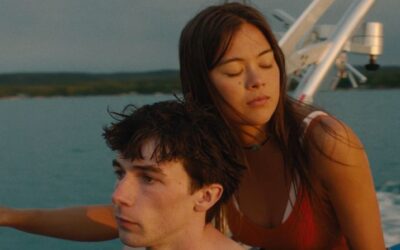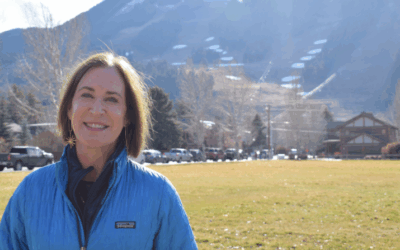Jackson Hole is often heralded as a conservation success story. But the human cost of that success is rarely part of the discussion. What is largely overlooked when folks celebrate the area’s vast swaths of protected land is the narrative of indigenous peoples.
In its next episode, the new KHOL podcast Yonder Lies: Unpacking the Myths of Jackson Hole examines regional indigenous history and myths that endure among non-Native people.
Co-creator Jesse Bryant says one of the most surprising things he learned making this episode is how prominently Wyoming and Jackson Hole figure in Native American history and law, all the way to the Supreme Court. The episode looks at two of those cases.
It also incorporates archival audio from the Jackson Hole Historical Society. Bryant’s partner, co-creator Hannah Habermann, pointed to the voice of Clyde Hall, a Shoshone-Metis elder from Fort Hall, Idaho. The former tribal judge, public defender, teacher and park ranger has been steeped in Native American and LGBTQ advocacy for decades.
“He talks a lot about the history of different peoples who lived here and how their lives were very dynamic and focused on resources and community,” Habermann said.
Hall also discusses the difficulties of keeping those stories alive, given the ways in which myths around Native Americans have so deeply pervaded the American cultural imagination, she said.
Hall’s words reminded Habermann of the very different stories she heard about Native Americans as a child.
“I think that’s an important reflection for me to go through and one that I hope our listeners can also go through.”
Minding Our Myths
Although the word “myth” is in the show’s title, Bryant urges listeners to reconsider how that word applies to the stories they highlight.
“The general understanding or definition of that word is a story that is false,” he said. “That’s not really what we’re talking about in this podcast, although it’s a totally valid definition of the word.”
Instead, Bryant said Yonder Lies examines “the stories that people tell themselves, whether true or not, about how they’re making meaning from their life, how they’re making meaning from experience.”
That means dissecting narratives built around Jackson’s history, such as the notion that “Jackson Hole started when white settlers moved here and that all of the history here is very white-centric,” Habermann said.
The pair will also analyze how a dominant white narrative spills into people’s perception of modern Jackson Hole.
“A lot of friends come here and they’re like, ‘Wow, Jackson is so white.’ And I say, yes, that is true,” Habermann said. “But 30% of the population here is Latinx. So what are we erasing when we say that?”
That Jackson is “incredibly wealthy” is also on the Yonder Lies radar. “How does buying into that myth prevent people from looking at ways in which certain spaces in Jackson are underfunded or certain people are really struggling?” Habermann said.
Introspection for All
The pair likes to point out that they are learning right alongside listeners. Bryant says discovering that he is perhaps part of the problem helped inspire the show. He said mentors here have often complained to him that “transience is killing this town and a lack of context and history.”
“Initially I was like, ‘Yeah, those transient folks. They all suck.’”
Then Bryant realized he was one of them, he said.
Still, it’s worth noting Bryant’s partner is no stranger to the mythos of the American West. Habermann was born and raised in Montana but headed east for university. That distance actually brought her closer to this part of the country.
“While I was out there, I realized all I was thinking about were issues in the Intermountain West.”
So she made this region the focal point of her environmental studies degree. Her senior thesis focused on narratives in the Intermountain West “and the ways in which those can be harmful or helpful.” She looked at how people come to learn about the region and the differences between what visitors experience and the lived realities of residents.
Later, both Habermann and Bryant traced a path to Jackson through their work with Teton Science Schools. Habermann created a resource there that became a prelude to this week’s episode: teaching the narratives of indigenous peoples.
Unlike Habermann, Bryant is a veritable Western transplant from Albany, New York. But similar to his partner, Bryant’s contrasting experiences in the East and the West helped catalyze Yonder Lies.
While studying at the Yale School of Forestry, Bryant felt a “mixed bag of emotions.”
“Throughout that experience, I zoned in on the question of why people seem to not really care about the environment, yet they talk about conservation a lot. And then meanwhile, our society keeps degrading land, keeps repeating the same patterns.”
Between his two years at Yale, Bryant worked on a project in Ten Sleep, Wyoming, a small town west of Buffalo comprised of folks like ranchers, hunters and an increasing number of recreationists. He chronicled a growing conflict there between rock climbers and cattle ranchers.
“Sure, rock climbers were bringing money to the area, but at the same time, there was this sad co-opting of the story,” he said. “This transition from a rugged individualist, agricultural story that permeated the town to this recreation leisure story.”
Bryant says watching that dynamic unfold elucidated the nuanced human narratives of the Mountain West and how land plays a role in them.
“It’s not just rote science, landscape ecology stuff. There’s another layer to it. And I think that’s what started the conversations about this podcast,” Bryant said. “That’s the lens that we want this podcast to take on about this place. What are the stories here?”
Uncovering such stories and telling them in engaging ways are key pieces of KHOL’s new programming ethos, says KHOL executive director Emily Cohen. “We’re changing our format and adding local and national podcasts, and also expanding our newsroom,” she said.
That is part of a larger effort to make KHOL “more than just about music.”
“We want to connect the community. There’s a lot of interesting stories here; there’s a lot happening. It’s a very dynamic place. And the more we can capture that conversation, the more we can be a valued service to listeners.”
Yonder Lies: Unpacking the Myths of Jackson Hole airs Sundays at 12:30 p.m. on Jackson Hole Community Radio.






